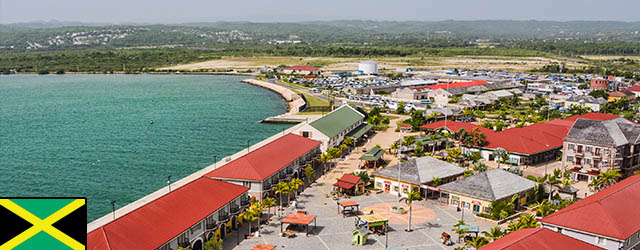After years of stagnation, Jamaica’s economy appears to be headed up. Debt reduction is a good start.

In general, countries have intermittent periods of economic growth and economic contractions. There are highs, there are lows. Then there’s Jamaica. The country’s been in a slump for 20 years.
Over the past two decades, annual gross domestic product growth in the island nation has averaged a mere 0.4%. During the same period, average per capita GDP shrank by 0.3%. “It’s the worst economic performance in the Western Hemisphere in the past two decades,” says Jake Johnston, a research associate and author of a paper on Jamaica at the Washington-based Center for Economic and Policy Research.
But there’s good news here. Jamaica may finally be about to turn things around. The government has embraced a number of strategies aimed at boosting foreign direct investment and decreasing the outflow of capital. More important, it is addressing what may be the biggest drag on the economy: government borrowing.
Officials in Kingston have already worked out an agreement to reduce money owed to Venezuelan oil company Petróleos de Venezuela. The discount roughly halved the amount Jamaica owes, from $3.2 billion to $1.5 billion. The deal will dramatically reduce the country’s debt-to-GDP ratio, according to the IMF. The multilateral organization estimates that the percentage will fall to 125% by the end of the current fiscal year, a drop from 138.5%. In a speech at the United Nations in August, prime minister Portia Simpson-Miller also asked for debt forgiveness for an association of small island developing states. Jamaica has also requested reparations from the UK for profits made off the transatlantic slave trade in the 18th century. It’s a long shot.
Still, the increasing optimism about Jamaica’s economic prospects can be seen in the capital markets. In August, Jamaica raised $2 billion in a highly anticipatedbond issue. A good chunk of the money will go to repaying the Venezuela debt. The government is also monetizing public assets such as airports and seaports through an ambitious privatization program.
Kingston’s efforts have been noticed elsewhere, too. Standard & Poor’s in June lifted Jamaica’s long-term credit rating to B from B-, with a stable outlook. S&P pointed to the country’s progress in lowering debt levels in explaining the hike. A month earlier, Moody’s Investors Services upgraded Jamaica’s government bond rating from Caa3 to Caa2 and reiterated its positive outlook on the country. Though the heightened rating is still well below investment grade, Moody’s said the country’s “fiscal consolidation and strong commitment to structural reform” led to the upgrade. The credit rater also expects Jamaica to get an economic boost from government efforts to reduce energy costs and attract foreign direct investment.
Certainly, FDI is key in Jamaica’s plan to become the logistics center of the Caribbean, according to Diane Edwards, president of Jamaica Promotions, during a telephone interview from Kingston. “We’re becoming the hub,” she says. “Kingston is one of the premier transshipment ports in the hemisphere. We overtook Buenos Aires the other day.”
Officials in Jamaica are looking to persuade multinational corporations to invest in other sectors as well. Business process outsourcing, international financial services and manufacturing are at the top of list. According a United Nations report, direct foreign investment in Jamaica in 2012 topped $413 million, nearly twice that of the previous year. In 2013, FDI went up again, to $593 million. Last year, the total fell to $551 million.
Two steps forward and one step back is better than no steps forward.
VITAL STATISTICS |
|---|
|
Location: Northwest Caribbean Sea |
|
Neighbors: Cuba, Cayman Islands, Haiti |
|
Capital city: Kingston |
|
Population (2014): 2.7 million |
|
Official language: English |
|
GDP per capita (2013): $5,290 |
|
GDP growth (Est. 2015): 1% |
|
Inflation (2014): 8.3% |
|
Currency: Jamaican Dollar |
|
Investment promotion agency: Jamaican Promotions Corporation |
|
Investment incentives available? Current free zones to be converted and expanded to special economic zones |
|
Ease of Doing Business rank (2014): 58 |
|
Corruption Perceptions Index rank (2014): 85 |
|
Political risk: No serious political risk |
|
Security risk: High, with gangs in some areas; reports of mob killings; trafficking in guns and drugs; organized crime considered a threat; 20% spike in murders |
PROS |
|---|
|
Active development bank; falling inflation; government actively courting FDI; established multinational community; no restrictions on repatriating profits; reduction in waiting time for building approvals to 90 days in most cases |
CONS |
|---|
|
Uncertainty about the impact on the country of resumption of relations between Cuba and the US.; vulnerable to price shocks, particularly sudden spikes in fuel or food prices; tax rates and electricity costs seen as constraints |
Sources: CanaNews; Caribbean Journal; Caribbean News Now; Control Risks; InSight Crime; International Monetary Fund; Jamaica Gleamer; Jamaica Information Service; Jamaica Online Star; New York Carib News; News Jamaica; Transparency International Center for Economic and Policy Research; World Bank.
For more information on Jamaica, check out our Country Economic Reports.



